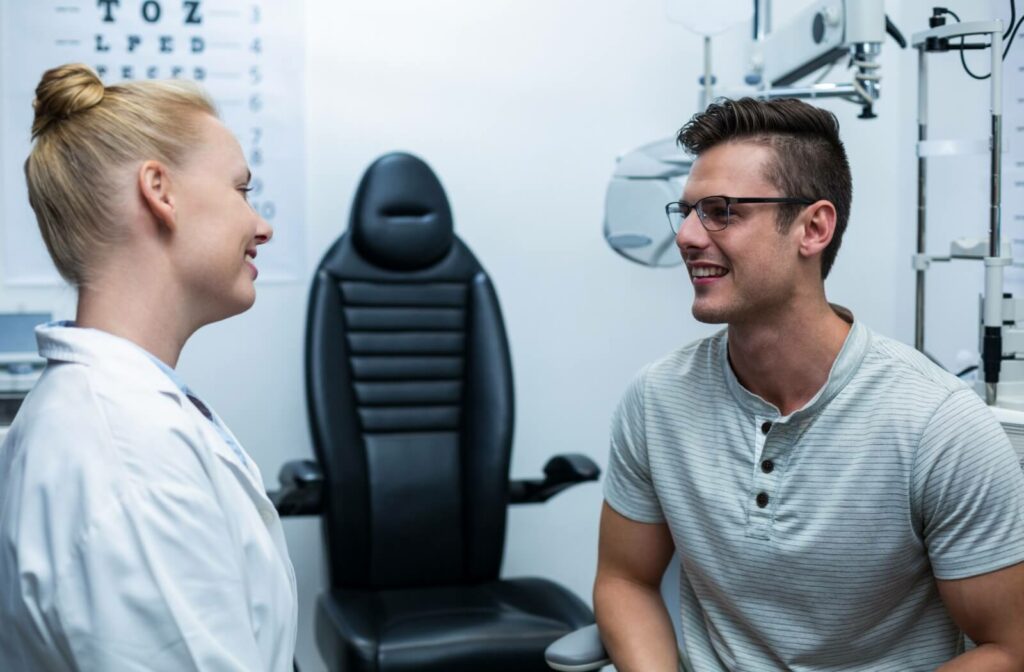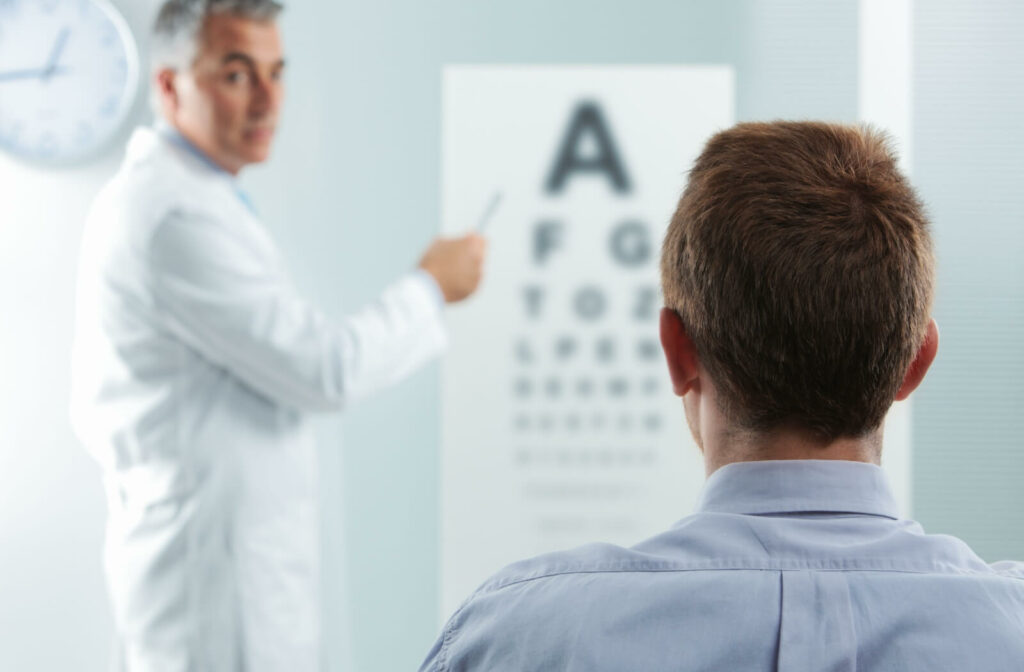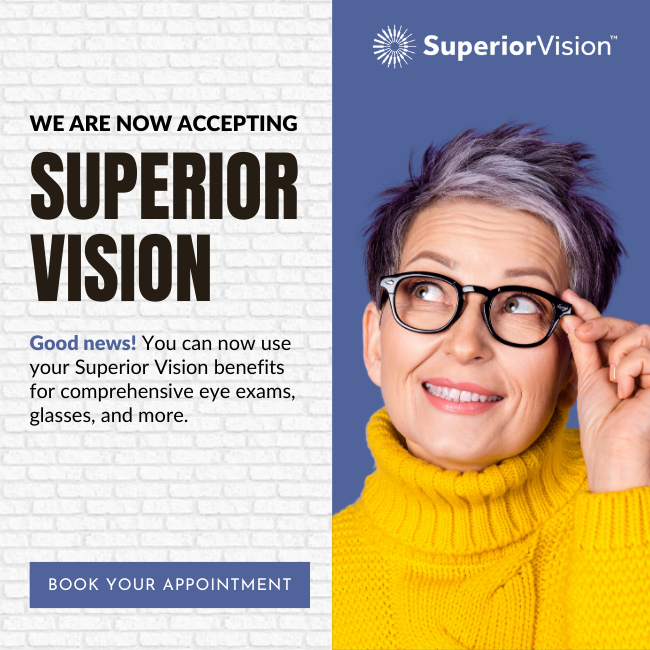Similar to visiting your primary care physician for a yearly physical exam or your dentist for an annual checkup and cleaning, it’s important to visit your eye doctor! Visiting your optometrist for a comprehensive eye exams is important for maintaining good ocular health, even if you don’t require glasses or contacts to correct your vision.
This is because eye exams can help detect potential ocular diseases or underlying health concerns that may go undetected due to few or no symptoms. While the frequency of the visits to your eye doctor depends on your overall ocular health, it’s recommended that healthy adults visit their optometrist annually for routine eye exams.
Routine eye exams can help your optometrist monitor for signs of possible ocular concerns such as vision correction, dry eyes, and ocular diseases like glaucoma or cataracts. The key is early detection.
Comprehensive Eye Exams
The American Optometric Association recommends that healthy adults aged 18 and above visit their eye doctor yearly for routine eye exams. These comprehensive exams can help prevent and treat ocular health conditions and maintain overall good ocular health. Even if individuals don’t require vision correction, it’s still recommended that they come in for annual visits.
Children as young as 6 months are encouraged to visit the eye doctor for routine eye exams. Like adults, it’s recommended that children come in annually for their comprehensive eye exams.
Patients who have diabetes, have high myopia, or are being monitored for ocular health concerns, like glaucoma or cataracts, may require more frequent examinations. Your optometrist will determine this frequency during your visit.
Many visual health concerns may go unnoticed as some individuals may experience little to no symptoms of any eye conditions. Plus, a comprehensive eye exam is more than just vision correction. It’s a detailed checkup of your overall eye health.
A routine eye examination includes preliminary testing before sitting in the exam room with your optometrist. The preliminary screening may include testing:
- Color vision
- Peripheral vision
- Depth perception
- Pupil reflexes
- Eye pressure
Once inside the exam room with your optometrist, your eye doctor may ask you a series of questions, especially if you’re a new patient, such as:
- Do you have any concerns with your eyes or your vision
- Do you have any family history of ocular conditions? (e.g., glaucoma, cataracts, macular degeneration, etc.)
- Have you had any injuries or surgeries to your eyes?
- Do you have a family history of medical conditions? (e.g., diabetes, heart disease, high blood pressure, etc.)
If you’re a returning patient, your eye doctor may ask if there have been any changes to your ocular or medical history since your last visit.
Inside the exam room, your optometrist will assess your vision and eye health:
- Visual acuity and refraction
- Eye coordination
- The overall health of the eyes
At the end of your eye exam, you may be given an updated prescription for eyeglasses. Your optometrist will determine whether they advise wearing glasses for full-time or part-time wear, depending on the severity of your prescription and lifestyle.
Contact Lens Exams
This specialized exam is similar to your eye exam for glasses and includes an additional prescription for your contact lenses. It focuses on making sure your lenses fit your eyes properly, reviewing your eyes’ health, and providing personalized instructions for contact lens wear and care.
It may be a surprise to some, but yes, eyeglasses and contact lenses will have slightly different prescriptions. You may find your glasses prescription slightly stronger than your contact lens prescription. This is because eyeglasses sit a few millimeters away from our eyes on the bridge of the nose, while contact lenses sit directly over the cornea of your eye.
We recommend contact lens wearers visit their optometrist annually for routine eye exams. Contact lens prescriptions are only valid for a year. If you’re interested in refilling your contact lens supply, be sure to book a comprehensive visit with your eye doctor!
As a first-time contact lens wearer, you must schedule a contact lens training appointment with our team so that we can teach new wearers how to insert and remove their contact lenses safely. This appointment includes details concerning the appropriate wear time, cleaning, maintenance, and dispensing of your contact lenses.
Contact lenses are considered a medical device. To prioritize the safety of our patients, booking contact lens training is required for eye care professionals to dispense contact lenses. With proper education and care, even children can safely wear contact lenses.
As a patient, if you’ve been wearing contact lenses for years, we still recommend coming in annually to update your contact lens prescription. During the contact lens fitting process, we can use this opportunity to adjust your contact lens needs. For example, if you’d like to make the switch from monthly lenses to dailies or if you’d like to explore multifocal contact lens options, we’re here to help.
Diabetic Health Exams
Individuals with type 1 or type 2 diabetes are encouraged to visit their optometrist for diabetic eye exams at least once a year. Depending on your ocular and family history, your optometrist may decide to conduct these exams more frequently to monitor any changes.
Diabetes can lead to serious vision concerns, such as blurry vision, diabetic retinopathy, and diabetic macular edema. To assess any diabetic changes to the eyes, your optometrist will need to conduct a dilation exam.
During this appointment, drops will be inserted into your eyes to help widen your pupils. These drops typically cause blurry vision and light sensitivity for a few hours. The drops can help your optometrist look for diabetic changes to your eyes caused by diabetes. Your optometrist may also perform additional peripheral vision tests to check for glaucoma or cataracts.
Unlike a comprehensive eye exam, you will not receive a prescription for updated vision correction at the end of your dilation appointment.

Visit Your Optometrist
The frequency of your optometry visits is not a one-size-fits-all prescription. We recommend that healthy patients visit their optometrist annually for routine eye exams. However, the frequency of these suggested visits may change based on an individual’s overall ocular health.
Maintaining a regular eye care schedule is essential for overall health and can help detect and treat serious health issues. Book an appointment with our team at Restore Vision Center to learn more about your ocular health needs!




